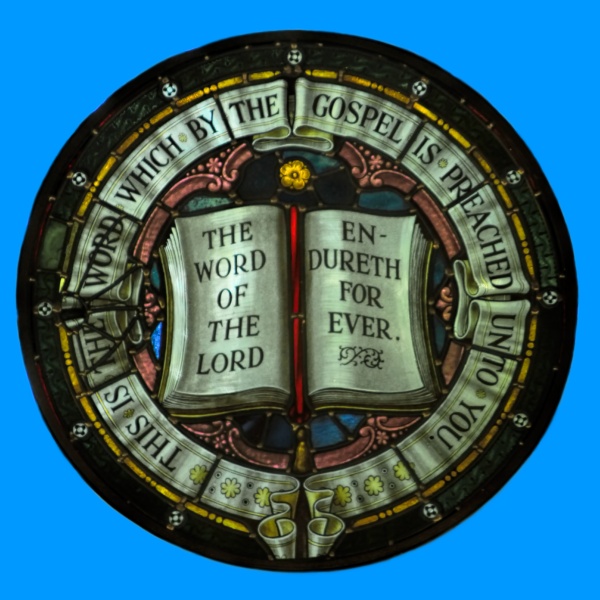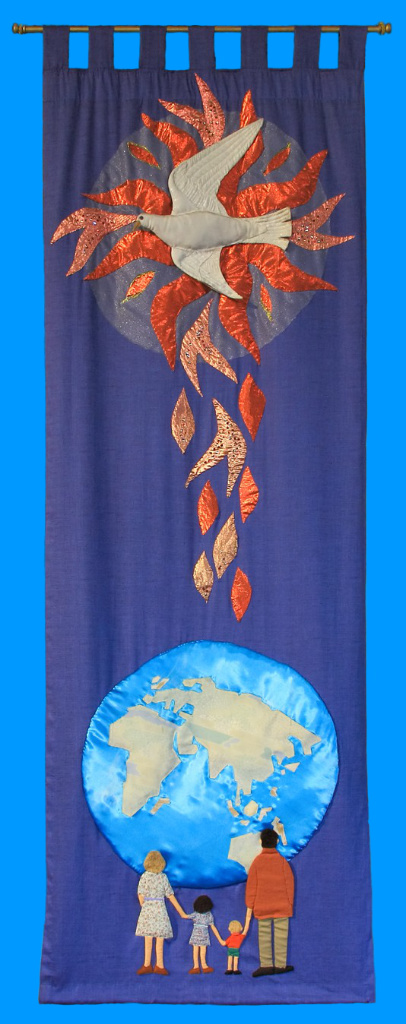Order of Service
Organ prelude: Voluntary in G – Henry Heron (1738 – 95)
Welcome
Call to Worship
Today is Valentine’s Day, and this year it coincides with Racial Justice Sunday. The United Reformed Church’s Global and Intercultural Ministries team have produced resources, which we will draw on at various points of the service, which consider the theme ‘What kind of love . . . ?’
1 Corinthians 13: 1 – 3 (NIV-UK)
‘If I speak in the tongues of men or of angels, but do not have love, I am only a resounding gong or a clanging cymbal. If I have the gift of prophecy and can fathom all mysteries and all knowledge, and if I have a faith that can move mountains, but do not have love, I am nothing. If I give all I possess to the poor and give over my body to hardship that I may boast, but do not have love, I gain nothing.’
HYMN
Love divine, all loves excelling
Text: Charles Wesley (1707 – 88)
Tune: Hyfrydol – R. H. Prichard (1811 – 87); harm. R. Vaughan Williams (1872-1958).
Last verse arr. N. Rawsthorne (1929 – 2019)
Prayer and the Lord’s Prayer
Lord, turn me inside out,
so people can see the You in me
with the same shape heart,
the same colour of blood
and one word in our flesh
that makes us like You
revealing the image of God
in our coats of many colours.
Lord, I love from the inside
what I see on the outside
so may we love what we see
and be loved for who we are:
Brothers and sisters,
united from inside out
to turn the world upside down!
Richard Becher
Lord God, as we think about the themes of love and racial justice today, we pray we would be open to the still small voice of your Spirit prompting our thoughts, bringing our lives to be more fully reflecting your glory. For we pray in the name of Jesus, who showed us how to pray in the words of the Our Father. Please join with me as we say together, Our Father . . .
Introduction to the first reading
This psalm is attributed to Asaph, who wrote a number of the Psalms, and was one of King David’s chief musicians. This psalm begins with the majesty of God, yet the context is one of judgement on the people. God says he will accept honest thanksgiving offerings, but judges those who are dishonest and testify against each other.
Reading – Psalm 50: 1 – 6
Organ interlude: Trio in G minor – Josef Rheinberger (1839 – 1901)
Introduction to the second reading
This reading is given for the week before the start of Lent, and is that majestic story of the transfiguration. It comes in Mark’s gospel a little after Peter has declared Jesus as the Messiah, and Jesus begins speaking about his death and resurrection. It’s a passage of hope to lead us into Lent.
Reading – Mark 9: 2 – 9
Sermon
We began the service with a verse from that wonderful passage from 1 Corinthians on love. I wonder what you think of that passage? Often, we focus on how we respond to others, especially our family and neighbours, our Church too. But what does it mean when we face the wider world and all that is going on?
Some questions are posed by the URC Global and Intercultural Ministries team who produced the Racial Justice Sunday resources, to get us thinking:
- What kind of love does God call us to embody and demonstrate?
- What kind of love does the Church embody, preach and enact?
- What kind of love enables injustice to continue and even flourish?
- What kind of love will or can engender change?
- What kind of love do oppressed and marginalised communities strive for?
When we think about those words of Paul in Corinthians, we hear that love is the over-riding quality desired of us. Whatever we do, if it is not done in love, is as if we’ve done nothing at all. That love, in our limited English word, isn’t a ‘like’ word, or an ‘attraction’ word, but a word which embodies the nature of God. God’s love is unconditional on our behaviour, or on anything else about us. We are loved by God whoever we are, whatever we look like, and whatever we feel inside.
It reminds me of the Peanuts cartoon from the 1960s, which I caught up with in the ’80s, being a baby in the 60s. You may remember the ‘Love is . . .’ theme. Within the cartoons themselves we see a number of characters who display unrequited love—it isn’t openly returned or understood, even though a response is deeply desired. In a sense, the cartoon’s love is like the love of God in that it’s a love despite the loved one’s flaws, and in that so often we don’t respond to the love of God. Yet God’s love has gone one stage further, in self-sacrifice on the cross, to redeem and transform all that is broken.
Which brings us to the main readings we had for today, from the lectionary. The verses following on in Psalm 50 give us another sense of God, that of justice, mentioned in verse 6 of the reading. Within that love, and even though that love is unconditional, in our response, we are required to be honest and open, to act justly. Towards the end of the Psalm, it speaks of injustice in those who slander each other, and make false accusations.
Does that ring any bells of injustice in our own world? It is the rich and well-positioned in life who seem to get away with what they like, using their money and influence to dodge justice. Whereas, it is those who are already in poverty and struggling in life who suffer injustice, even in our UK justice system. This imbalance is only too clear when we consider the pandemic. Those who are in lower paid jobs are the ones who have lost jobs or have had to continue working and have been most vulnerable to the virus. There is also evidence that they too are the ones who are missing out on the vaccine, not to mention poorer countries.
As we think of Racial Justice Sunday it’s not hard to see how ‘white supremacy’ has the upper hand. While some may not like the term, if we consider our own lives in humility of spirit before God, we are so blessed with all we have, and may not have experienced anything else, or have been able to put our feet in the shoes of others.
For myself, at sixth form college, I was surprised by a friend saying I was upper middle class, just because of the area I lived in. My parents’ roots weren’t as such. Even though my dad had won a scholarship to the main public school in Brighton, his family couldn’t afford the uniform, so he couldn’t take it up. But my parents had been successful in business, my Mum having been brought up in a newsagent business, and they were able to afford to build a house in an area solely of professionals. And I know they were ostracised at first in that area. Yet we were still very privileged. Even now I reflect that I can go to the supermarket and buy whatever I like. So many can’t, and don’t even have enough to eat. Where is the love, where is the justice, even in our own lives and way of living?
Yet God is a God of transformation, and a God who calls us to see things differently, to see what is happening around us, to see what God can see. In that story of the transfiguration, one that I find inspirational to my faith in how it is spoken of elsewhere by the apostle Peter, the disciples saw Jesus differently. No longer was he just a Rabbi who could heal the sick, cast out demons, walk on water, calm the storm, to name but a few, his clothes shone as dazzling white. Something else was happening here, that spoke more of Jesus’ divinity than any other experience they had had of him.
In the Racial Justice Sunday opening reflection from Rev’d Zaidie Orr, a Minister in the Sheffield group, she talks about the mountaintop experience and the experience of going back down into the valley. The mountaintop was a place the disciples wanted to stay, in that image of building the shelters for Jesus, Moses and Elijah. She says, ‘Like Peter, most of us would like to stay on the mountaintop – in that wondrous space, far from the trials of reality – but we know that there is work to be done in the valley, where we truly encounter life in all its complexity.’
That light of transfiguration, Zaidie reminds us, is shining where there is racial injustice. It is the light of hope, the source of our vision, ‘as we journey down to where Jesus calls us, knowing that he is with us in all things.’ Zaidie goes on to remind us that, ‘the light of Christ is not for keeping to ourselves—these are gifts to be shared; gifts which can illumine the issues which divide our communities, our nations and our world today. Gifts which can help bring transformation—right here, in the valley, where we live and love and seek God’s will.’
So what of that love? Have our hearts missed a beat as we’ve been listening or reading today? What is our response to injustice in our world today, especially of racial injustice this day? Does Christ’s transfiguration transform our lives, or the realisation of the deep love of God which extends to all? Have our own attitudes shifted a little?
Perhaps some of us can do a little more than just be friendly in our own neighbourhoods. Perhaps we can do a little to work for racial justice in our world, to bring the light of Christ, the hope of transformation to those who suffer such injustice. Perhaps we can stop saying, we can do this, and start asking how, in Christ, can we serve you?
Amen.
HYMN
Moses in Egypt, for you, faced injustice
Text: John Campbell
Tune: Faithfulness – W. M. Runyan (1870 – 1957)
Prayers of Intercession
HYMN
For the healing of the nations
Text: Fred Kaan (1929 – 2009)
Tune: Nomen salvationis – Ian Lawrie (b. 1951)
Blessing
(from the URC resources for Racial Justice Sunday)
May God’s grace and love fill the earth and also our hearts
May justice flow like a roaring, mighty river
May peace descend like a dove upon quiet waters
And may we be mindful always that in God’s Kingdom
All are loved to overflowing. Amen.
Organ voluntary: Toccata in Seven – John Rutter (b. 1945)


